Events
-
-
Field to Database: Collecting Biodiversity Data in the Age of Global Databases
Instructor: Dr. Joey Shaw (UT-Chattanooga) *Note course runs Sunday-Thursday* During this course, students will obtain a comprehensive understanding of how biological collections are made in the field and eventually uploaded to national and international data portals, like iDigBio or GBIF. We will help you to download and install important helpful apps and teach you how to use them in series to go from field to data portal. Students will leave the course having collected Plantae specimens, made labels, mounted specimens, and uploaded digital data to global portals. In addition to teaching and focusing on these skills, I can also help you key out and identify plant species that you might encounter and want to collect in the field, although you should have some cursory skills. Pre-requisites: This course is designed for young professionals who will be making biological collections of plants or fungi (professors, conservation workers, graduate students, undergraduate students, and naturalists), although it is open to others with an interest in this subject. No previous experience is required. Depending on the different field trips, participants should be prepared to put in at least a couple of 12-hour days. It would be great if you have had at least a class in Field Botany, Plant Taxonomy, Local Flora, or similar, but that is not necessary either. Course Outcome: Leave having collected and digitized Plantae specimens, including labels, transcribed text data & images. For more information, visit https://highlandsbiological.org/summer-2023-academic-courses/.
-
Conservation Genetics of Salamanders
Highlands Biological Station 265 North 6th St, Highlands, NC, United StatesInstructor: Dr. JJ Apodaca (Tangled Bank Conservation) The field of conservation genetics is rapidly emerging as an exceedingly vital component of conservation biology. This course focuses on salamanders to explore the fundamentals, cutting edge techniques, theories, and issues surrounding conservation genetics. Salamanders are one of the most endangered vertebrate groups in the world and are extremely diverse in the southern Appalachians, making them an ideal focal group for an introduction to the world of conservation genetics. In this short course, participants will become familiar with how to design, carry out, and interpret a conservation genetic study. We will also focus on learning to identify, work with, and appreciate the local salamander diversity. Participants will become acquainted with commonly used laboratory techniques and current literature pertaining to the conservation genetics of salamanders. This course is designed for students and others interested in working in the field of wildlife management that want to learn more about conservation genetics. Pre-requisites: Introductory biology, ecology, or permission of instructor. For more information, visit https://highlandsbiological.org/summer-2023-academic-courses/.
-
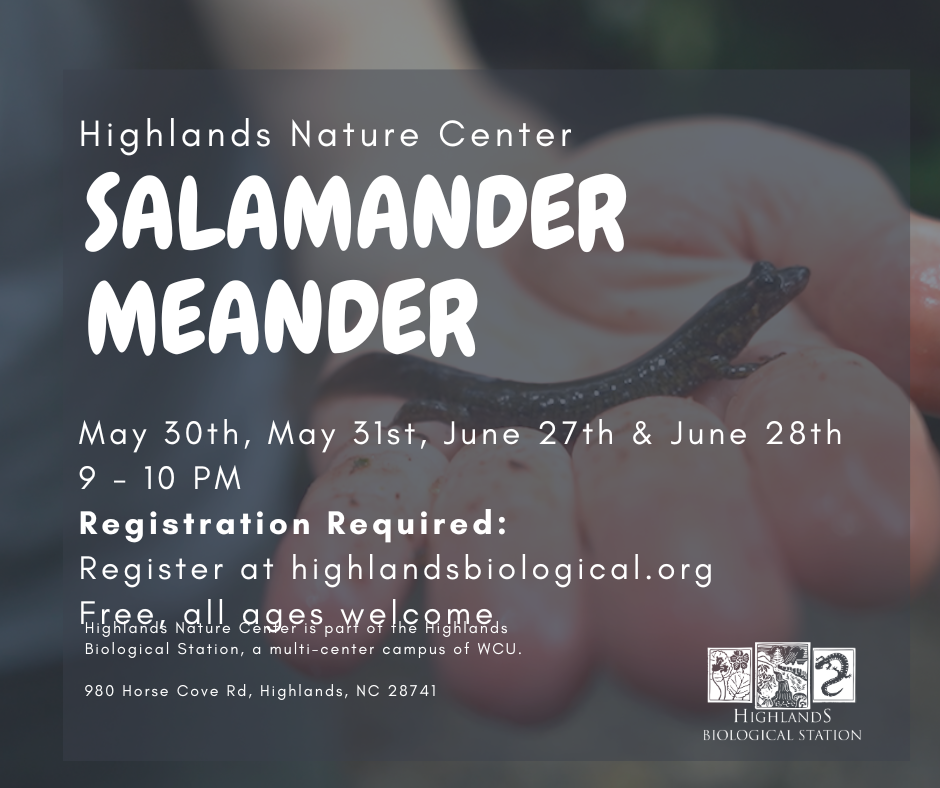
Salamander Meander
Highlands Nature Center 930 Horse Cove Rd., Highlands, NC, United StatesJune 27th (Register HERE) 9 - 10 PM FREE, all ages welcome Registration required Search for salamanders in the Botanical Garden! Discover strange and fascinating facts about our slimy amphibian friends, then join naturalists on a walk through the gardens to find local species. Please bring a flashlight for this adventure! This program is weather-dependent.
Free -
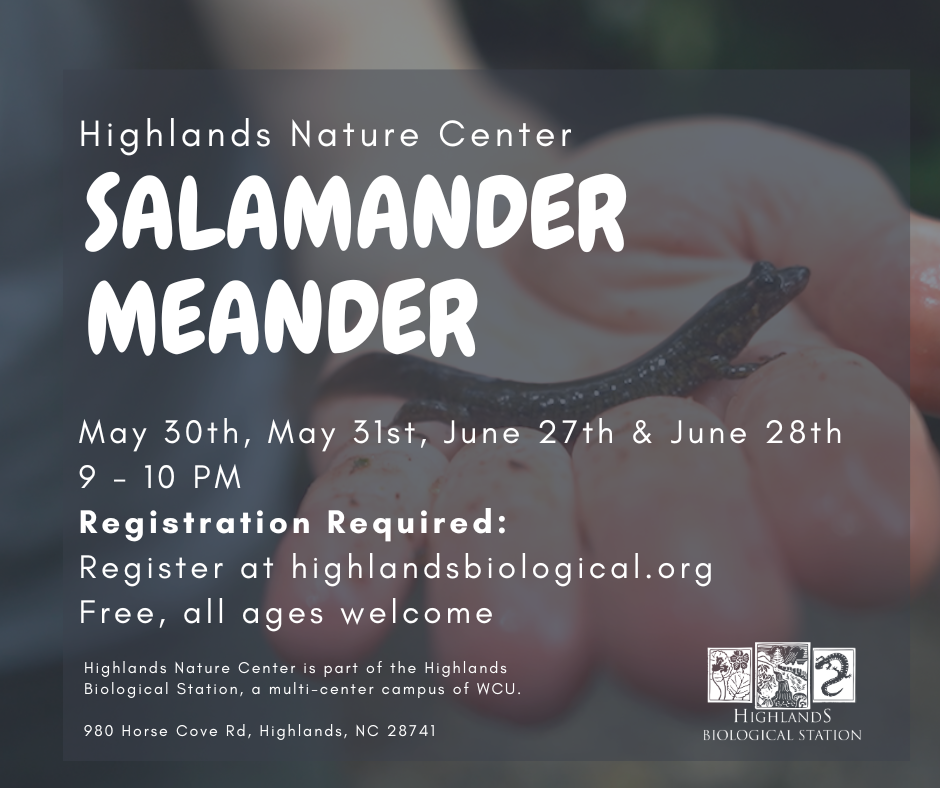
Salamander Meander
Highlands Nature Center 930 Horse Cove Rd., Highlands, NC, United StatesJune 28th (Register HERE) 9 - 10 PM FREE, all ages welcome Registration required Search for salamanders in the Botanical Garden! Discover strange and fascinating facts about our slimy amphibian friends, then join naturalists on a walk through the gardens to find local species. Please bring a flashlight for this adventure! This program is weather-dependent.
Free -
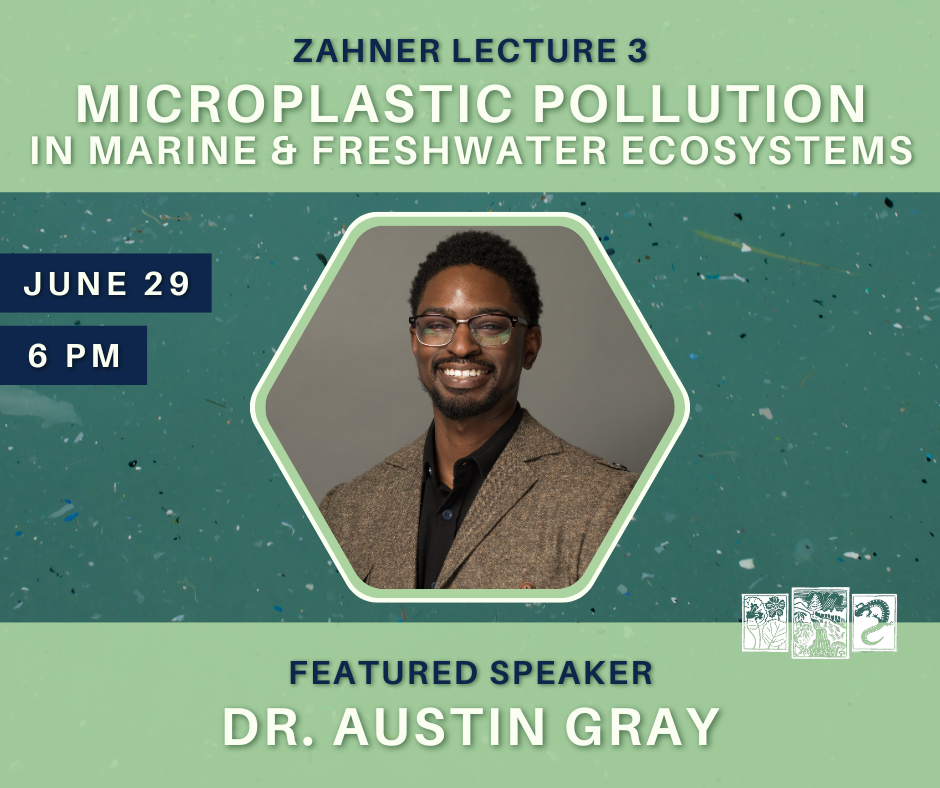
Zahner Lecture 3
Highlands Nature Center 930 Horse Cove Rd., Highlands, NC, United StatesLecture 3 - Microplastic Pollution in Marine and Freshwater Ecosystems Featured Speaker: Austin D. Gray, Ph.D.; Assistant Professor of Biological Sciences; Virginia Tech Date: Thursday, June 29th Time: 6pm – 7pm Cost: FREE Sponsored by Jennifer & Forrest McConnell and Jennie Stowers. Plastic pollution poses one of the greatest global risks to freshwater and marine ecosystems. The formation of microplastics from plastic debris has been shown to alter aquatic ecosystems by disrupting biota populations. In this talk, topics surrounding plastic pollution, microplastic occurrence and distribution, toxicological impacts of microplastics, toxicokinetic aspects of microplastic uptake and depuration, and microplastic formation rates in marine and freshwater habitats will be discussed.
Free -
-
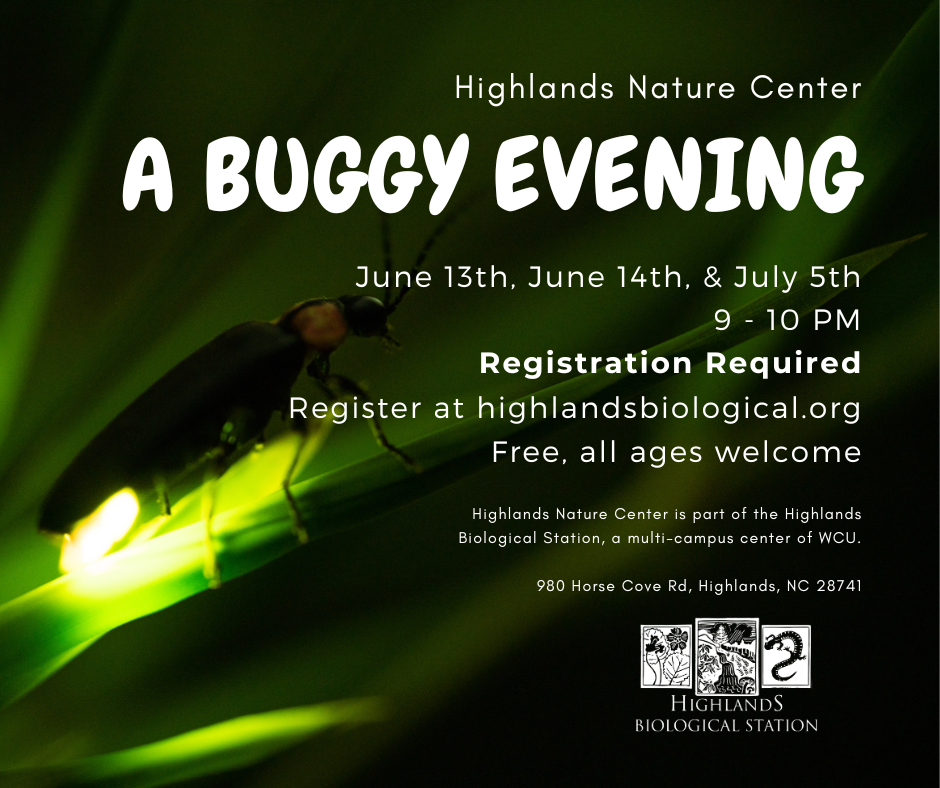
A Buggy Evening
Highlands Nature Center 930 Horse Cove Rd., Highlands, NC, United StatesJuly 5th (Register HERE) 9 - 10 PM FREE, all ages welcome Registration required Experience the world of our smallest nocturnal creatures—insects! Learn to identify unique and beautiful insects then join naturalists to look for fireflies and nocturnal creepy crawlies in the Botanical Garden. Please bring a flashlight for this adventure! This program is weather-dependent.
Free -
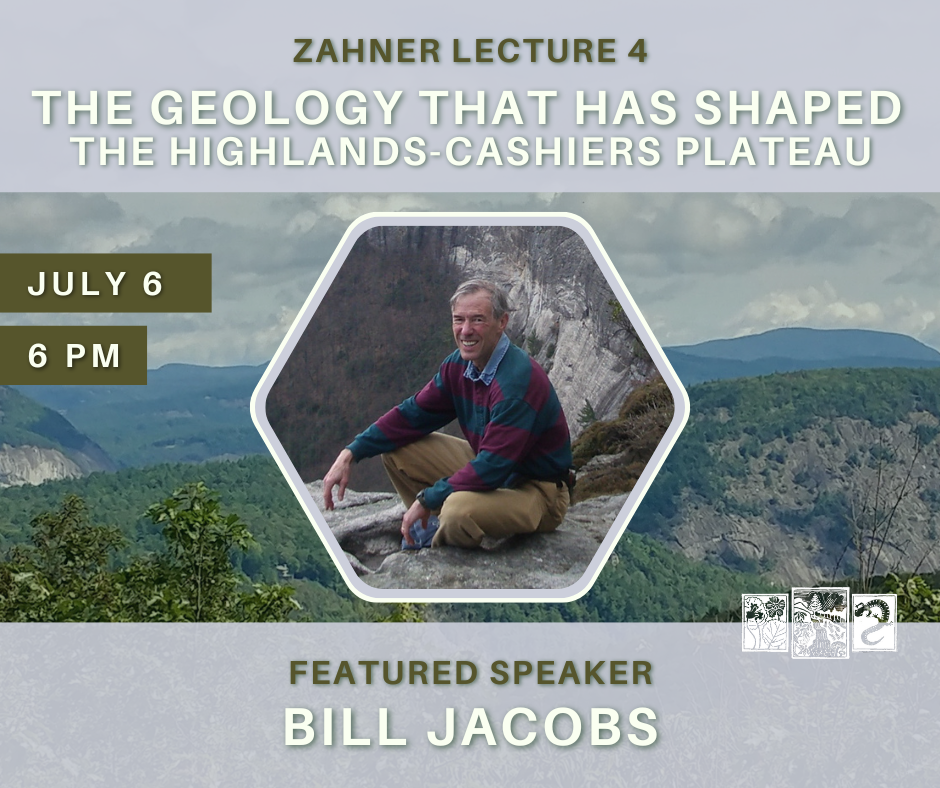
Zahner Lecture 4
Highlands Nature Center 930 Horse Cove Rd., Highlands, NC, United StatesLecture 4 - The Geology That Has Shaped the Highlands-Cashiers Plateau Featured Speaker: Bill Jacobs, Geology Enthusiast and Author of Whence These Special Places – The Geology of Cashiers, Highlands & Panthertown Valley Date: Thursday, July 6th Time: 6pm – 7pm Cost: FREE Sponsored by Anne & Dick Goodsell: The Claude Sullivan Geology Initiative The Highlands-Cashiers Plateau is a unique landscape, with high valleys, an extraordinary array of waterfalls and mountains, and rich biodiversity. In this lecture, we will explore the geologic processes, stretching back over 500 million years, that have created the Plateau and shaped today’s special landscape. Our speaker will use concepts and language comfortable for the non-scientist and will discuss how geology, some of it ancient and some much more recent, has determined the character and appearance of both the broader Plateau and many of its specific mountains and waterfalls.
Free -
Introduction to Brightfield and Fluorescence Microscopies
Highlands Biological Station 265 North 6th St, Highlands, NC, United StatesInstructor: Dr. Bob Youker (Western Carolina University) In this lecture/lab course, students will learn how to prepare their field samples for brightfield and fluorescence microscopic examination. Students will also learn how microscopes generate images, the experimental conditions needed for optimal imaging of their specimens, and learn basic image processing techniques for analysis. The course will be a combination of lecture and hands on specimen preparation and imaging (lab). Students can either provide specimens from their field research, or work with the instructor to collect rotifers and other aquatic micro-invertebrates from the field to use in the lab portion. Lab time will be centered on learning the parts and functions of modern brightfield and fluorescence (widefield & confocal) microscopes, preparing specimens (e.g., staining with fluorescent dyes), and acquiring images of their specimens for analysis. Students will learn to acquire images using a widefield fluorescence microscope and take a “field trip” to WCU to use the state-of-the-art Leica Stellaris 5 confocal microscope. We will also discuss some other modern approaches to fluorescence microscopy, such as electron and super-resolution microscopies. Each student will prepare a final report that compares brightfield to fluorescence images taken of their samples. The student will explain in detail the features observed using both methodologies and the advantages and disadvantages of each method. The student will also give a short oral presentation on one microscopic technique not covered in the course and this topic will be selected from a list provided by the instructor. Pre-requisites: Introductory biology sequence For more information, visit https://highlandsbiological.org/summer-2023-academic-courses/.
-
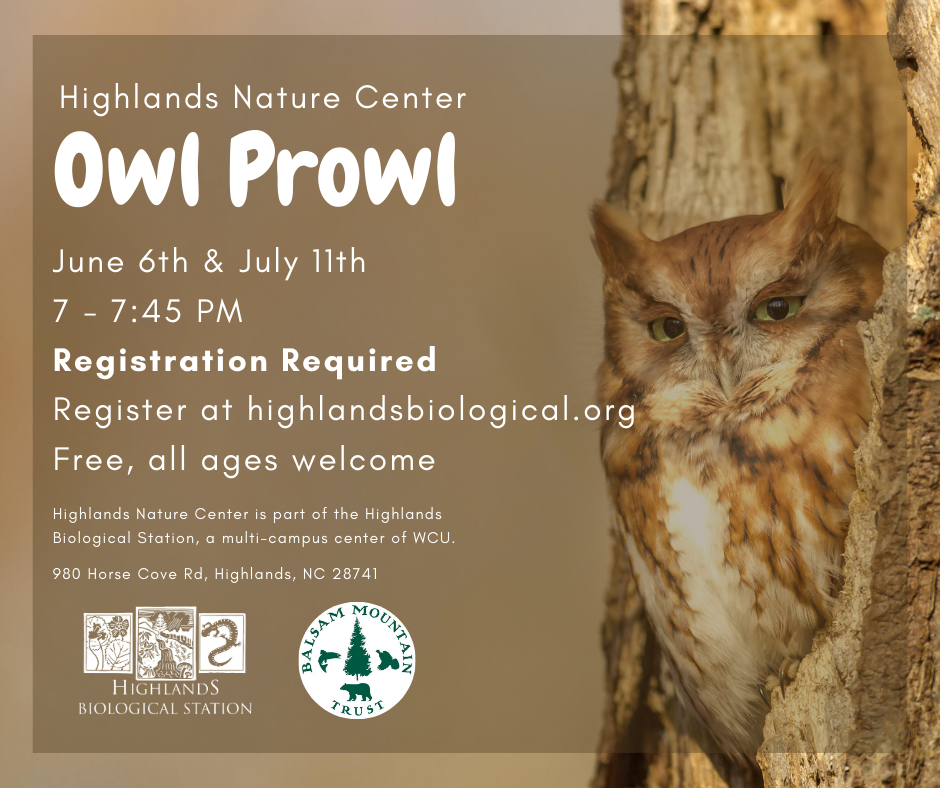
Owl Prowl
Highlands Nature Center 930 Horse Cove Rd., Highlands, NC, United StatesJuly 11th (Register HERE) Time: 7pm – 7:45pm FREE, all ages welcome Registration required Who-oo goes there? Join Balsam Mountain Trust for a special meeting with their live owl ambassadors and learn more about these amazing nocturnal raptors. Please bring a flashlight for this adventure! This program is weather-dependent.
Free -
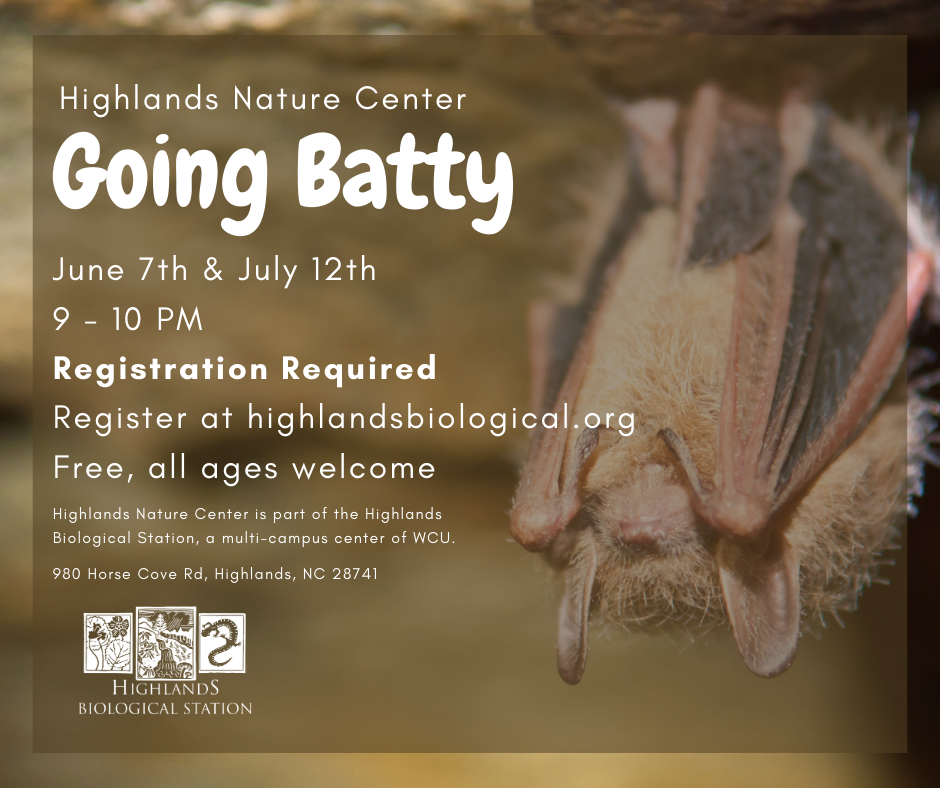
Going Batty
Highlands Nature Center 930 Horse Cove Rd., Highlands, NC, United StatesJuly 12th (Register HERE) Time: 9pm-10pm FREE, all ages welcome Discover the nocturnal mammals who take to the skies! Learn about the fascinating world of bats, then join naturalists in the Botanical Garden to seek them out. Please bring a flashlight for this adventure! This program is weather-dependent.
Free

Recent Comments